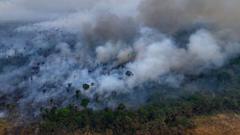**In 2024, 67,000 square kilometers of tropical forests vanished, raising alarms over biodiversity and carbon offsets crucial for climate stabilization.**
**Tropical Forests Face Unprecedented Destruction Amid Climate Crisis**

**Tropical Forests Face Unprecedented Destruction Amid Climate Crisis**
**Latest satellite data reveals record loss of old-growth tropical forests as climate and human activities converge.**
New findings indicate that tropical forests worldwide have endured their most significant loss ever recorded in 2024, according to recent satellite analysis. Researchers estimate that approximately 67,000 square kilometers (or about 26,000 square miles) of these vital ecosystems were destroyed, an area comparable to the size of the Republic of Ireland, equating to the rapid loss of 18 football fields every minute.
Fires emerged as the leading reason for this alarming trend, surpassing agricultural land clearing for the first time in history, with the Amazon region suffering disproportionately amid severe drought conditions. Conversely, there was some encouraging news from Southeast Asia, where proactive governmental policies have successfully curbed forest loss.
Tropical rainforests are essential carbon sinks, housing vast amounts of carbon in their soils and plants. However, the revelation of record levels of deforestation raises critical questions about their ability to withstand the impacts of climate change. Experts express concern that certain forests, especially portions of the Amazon, could be nearing a "tipping point" after which they could undergo irreversible degradation.
Prof. Matthew Hansen, co-director of the GLAD laboratory at the University of Maryland, labelled the findings as "frightening," and indicated that a phenomenon dubbed "savannisation" could be plausible, where vibrant tropical forests die off and convert into savanna ecosystems. Moreover, a recent study echoed these concerns, warning of potential extensive dieback of the Amazon if global temperatures rise beyond the targeted limit of 1.5°C set by international agreements.
Historically, the Amazon rainforest has absorbed more carbon dioxide than it released, but accelerated burning of these forests now contributes significantly to atmospheric CO2 levels, exacerbating climate change. The period from 2023 to 2024 registered the Amazon's most severe drought on record, worsened by climate change and the El Niño weather pattern. Deforestation through deliberate fires for agricultural expansion complicates the situation, but the drought conditions also proved conducive for rapid fire spread, particularly in Brazil and Bolivia.
A global trend shows that the frequency of intense tropical fires is on the rise, moving beyond simply agricultural land clearing. Rod Taylor from the World Resources Institute highlights this alarming new phase, indicating a dangerous climate feedback loop where fire intensity continues to escalate.
This unprecedented destruction of old-growth tropical forests has resulted in the release of an estimated 3.1 billion tonnes of greenhouse gases, approximately equivalent to the emissions of the entire European Union.
Amid the disheartening data, Southeast Asia presents a stark contrast where improved governance and community engagement has led to an 11% decline in forest loss in Indonesia. Elizabeth Goldman from the Global Forest Watch project attributes this positive trend to the enforcement of strict no-burning laws. Strengthened political will is deemed crucial for continued success.
However, Brazil and other nations have faltered due to inconsistent conservation policies. Prof. Hansen stresses the need for reliable legislation to sustain gains in forest conservation over time.
The upcoming UN climate summit, COP30, set to unfold in the Amazon, is perceived as vital for advancing global forest protection initiatives. One proposed mechanism includes financial incentives for nations that prioritize the preservation of tropical forests. According to Rod Taylor, this innovative approach could address the economic imbalance where immediate profits from logging often outweigh the benefits of conservation.
As the battle to protect these crucial ecosystems intensifies against the backdrop of climate change, effective and sustained action remains imperative to preserve our planet's biodiversity and ensure a stable climate future.




















